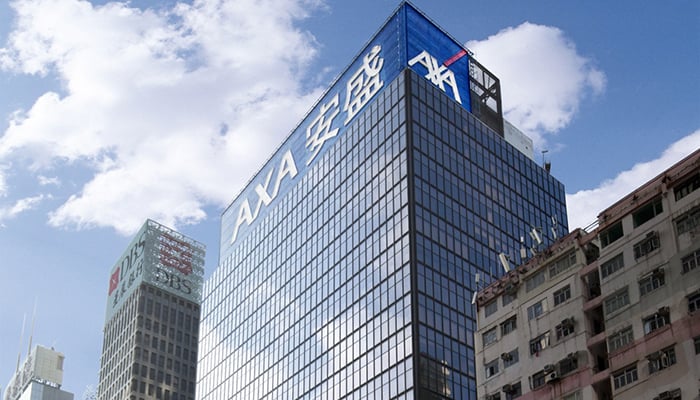As AXA’s CEO of Hong Kong, Macau and Greater China, Sally Wan is responsible for overseeing all lines of business in Hong Kong, Macau, and mainland China, including life and health insurance, employee benefits, and general insurance.
The operations are spread across various companies throughout the Greater China region. AXA has a substantial presence, with a life insurance joint venture with ICBC and 100% ownership of the general insurance company in mainland China. In Hong Kong, the insurance giant also operates as a top insurer in the general insurance and employee benefits sector, holding a top seven position in the life insurance sector.
It’s a big role to fill, with numerous demands and responsibilities that span several countries – but it’s all in a day’s work for Wan, who joined the insurance industry following a career in finance. Insurtech Insights finds out more.
How did you come to the insurance industry? What drove you towards it?
My entry into the insurance industry wasn’t initially planned during my time at KPMG. While working in the audit department, I became involved with a unit that exclusively dealt with banking and insurance clients. Consequently, I found myself regularly engaged in audits related to both banking and insurance sectors. When I made the transition from auditing to consulting many years ago, the consulting arm was highly active, and I began working on projects involving insurance clients. This immersion into the insurance sector marked the beginning of my journey in the industry.
As time went on, more insurance employers started approaching me, and I found myself increasingly embedded in the insurance field. Initially, I had thought that banking might be a more attractive career path, but my experience in the insurance industry changed my perspective. I grew to appreciate the vastness of the industry and its critical role in society. Insurance is not limited to just personal insurance that provides individuals and their families; it extends to commercial insurance that protects businesses from some of the most common losses such as building damage, business interruption, cargo loss, etc, without which businesses wouldn’t function. I began to recognise the profound significance of this industry, intimately connected with society.
You climbed the corporate ladder very quickly and spent several years as CFO with Allianz in Tokyo. Can you tell us about that role specifically and also what takeaways that experience as a CFO brought to you now that you are a CEO?
My background in finance has proven invaluable in understanding the intricacies of insurance, particularly in comprehending the financial models, translating them into tangible strategic actions to drive sustainable and profitable growth. As both a former CFO and now a CEO, this financial foundation has been essential. Even though I may not delve into the financial details as closely in my current role, I have a solid understanding of what strategic decisions can optimise our business growth while maintaining a strong financial position. It’s about striking the right balance between business expansion and maintaining a healthy bottom line and solvency position, while delivering sustainable value for the company and society.
The key shift in mindset and skill set has been in the realm of distribution and communication. Managing a substantial distribution force and effectively marketing the company to attract external business are pivotal aspects of my role now. However, I firmly believe that having a finance background provides a solid foundation for understanding the financial intricacies of the business, making strategic decisions, and ensuring long-term success.

What’s your perspective on the insurance market within Asia at the moment? How is it developing? What changes are you seeing?
The insurance market, particularly in Greater China and Southeast Asia, is undoubtedly a growth sector. The evolving needs of a more affluent middle class lead to increased demands for life and health insurance. Similarly, SMEs require various forms of commercial insurance to protect their businesses. Thus, the entire insurance market in Asia is positioned as a growth market.
Different countries in Asia are at various stages of development. For instance, Hong Kong and Japan grapple with ageing populations, which necessitates tailored insurance solutions for individuals with substandard health and unique coverage requirements. Additionally, insurance is closely linked with infrastructure development in Asia, given the extensive construction projects underway. Therefore, there are numerous areas of growth and opportunity within the insurance sector in the region.
COVID-19 has had a profound impact on customer behaviour, prompting a rapid shift towards digitalization. Even in mature markets like Hong Kong, the adoption of digital tools, such as teleconsultations and mobile applications, has significantly increased.
The changes and transformations in the industry also bring about regulatory modifications. These regulations evolve to address the challenges and opportunities presented by the digital era, with a particular focus on customer protection and fostering market competition. All these factors combined contribute to the growth and dynamism of the insurance industry in Asia.
Learn more about Asian Insurance market at Insurtech Insights Asia 2023. Learn more here.

What are the differences between doing business in Hong Kong to doing business in greater China?
Indeed, there are notable differences between the insurance markets in Hong Kong and mainland China. These disparities arise from varying regulatory environments, market needs and maturity levels, and the pace of development. Let me highlight some of the key distinctions:
Firstly, the regulatory framework for insurance is different between Hong Kong and Mainland China. That leads to differences in product offerings and features. The openness of the Hong Kong market for investment and asset allocation differs from the more restricted Chinese market. Hong Kong is an international financial hub with a more diverse range of products including life and health insurance, wealth management with different currency options, general insurance, and specialty lines.
Digital transformation is another big disruptor. China is ahead of Hong Kong in terms of digital transformation. Chinese consumers widely adopt digital tools and platforms for various aspects of daily life, including mobile payments and online services. This contrasts with Hong Kong, which is catching up in terms of digitalisation.
Both markets share commonalities in customer needs for life, health, and commercial insurance. However, differences in regulations and product features create opportunities for mutual learning and growth. International insurance companies operating in these markets can leverage their global experiences to adapt to local requirements and bring more advanced experience in emerging risks coverage, such as climate risks, to the Greater China market.
Which major trends are driving development within Asia?
Absolutely. The intersection of the insurance industry with AI and technology is a critical area of development. AI, particularly machine learning powered by big data, is transforming the insurance landscape by driving innovation in products and customer experiences. Here are some key trends and insights in this domain:
AI is enabling insurers to personalise products and customer experiences like never before. It’s not just about tailoring insurance policies but also about enhancing customer service. AI is being used to improve call centre operations, provide faster access to information, and streamline interactions between AI and human agents to better serve customers.
The insurance industry is rich in data, and the ability to effectively collect, organise, and analyse this data is becoming an art. Insurers who can harness data quickly and efficiently have a competitive edge. This data-driven approach is instrumental in product innovation and improving customer experiences.
The Asia-Pacific region, including Hong Kong and China, is witnessing a surge in insurtech startups. These startups are offering various solutions to optimise insurance operations, such as creating marketplaces for insurance products and enhancing customer loyalty. Collaborative platforms, like those integrated into WeChat in China, are gaining popularity to create win-win situations for providers and customers.
Another significant trend is the convergence of health services and insurance through technology. Digital platforms are emerging to help customers improve their health and wellness, engage in regular exercise, and adopt healthier lifestyles. Insurers are partnering with these platforms to offer health insurance tied to a range of health and wellness services including telemedicine and mental health support, creating a mutually beneficial relationship.
Companies are also increasingly investing in data science teams to stay on the cutting edge of technology. This is particularly important given the advancements in medical science, resulting in longer life expectancies. In Hong Kong, where people are ageing and living longer, insurers are exploring ways to adapt to these changes, to innovate insurance solutions to serve the ageing population. This intersection of technology, medical science, and insurance will undoubtedly shape the future of the industry.
What leadership skills have carried you through these tough times?
Navigating a crisis, especially during challenging times from the social unrest in Hong Kong in 2019 then three years of Covid-19 lockdown, requires strong leadership and specific skills.
Having a clear vision for the organisation’s long-term sustainable growth is paramount. Leaders must communicate clearly and timely to the team with a well-defined roadmap for prioritised actions needed to ensure the company’s continuity and success during the crisis.
During a crisis, it’s vital to bring the team together. Effective people management skills come into play. Leaders should instil a sense of security and confidence in the team, ensuring they see a future within the company. Open communication and empathy are key in helping team members navigate uncertainty.
Crisis situations are marked by uncertainty, and everything can change rapidly. Leaders need to foster a culture of flexibility and agility within the team. This means being open to adapting to different environments, changing course when necessary, and seizing opportunities for transformation and growth.
Crisis periods can provide opportunities for transformation. Leaders should encourage a transformation mindset within the organisation, inspiring the team to innovate and find new ways of doing things. This mindset shift can lead to long-term improvements and resilience.
Maintaining a positive outlook and instilling optimism in the team is essential. While crises can be challenging, a positive attitude can inspire resilience and determination, helping everyone work towards a brighter future.
Despite the difficult period we’ve been through, there’s still a remarkable level of enthusiasm and innovation in Asia’s startup ecosystem. Entrepreneurs are continuing to generate fresh ideas and pursue opportunities, which is quite encouraging to see.
What advice would you give to your younger self or to emerging leaders in the industry?
If I could offer one piece of advice, it would be “patience.” Senior leaders often have a strong drive to achieve results quickly, but it’s also essential to remain patient, especially during challenging times. We often face complex and challenging decisions that require careful consideration, and it’s crucial to bring the entire team together to understand diverse perspectives.
Managing people requires a great deal of patience, time, and attention. Looking back, I can recall instances where I was too hasty in making decisions, and rushing rarely leads to the best outcomes. So, even today, I remind myself to exercise patience especially in change management and allow the team to carry out necessary actions to achieve the best outcomes.
Looking at the market as you see it now, are more women entering the insurance industry within Asia now? And if so, are many of them like yourself climbing to leadership positions? How is the, I suppose, diversity landscape looking?
Gender diversity in the insurance industry has made significant progress in Asia over the last decade. The Hong Kong Federation of Insurers (HKFI) had done a survey recently and showed that 21% of insurance companies CEO are female, which exceeds the percentage of female C-suite and senior leadership in other financial sectors in Hong Kong. And the majority of insurance companies have more than 40% of senior leaders holding C-level positions, which is a positive development.
At Axa, we have achieved 50-50 gender balance in C-level positions. The next step in this journey, especially in Asia, is to increase female representation on Boards. While we have female CEOs, there’s room for growth in female board memberships. It’s a positive trajectory that we’re on, and I believe we’re moving in the right direction.

What can we expect from AXA in Asia over the next 12 to 18 months? Any new developments? Any new projects you can tell me about what’s going on?
Over the next 12 to 18 months, you can expect AXA in Asia to be highly responsive to customer needs and societal changes. We will focus on several key areas of development:
We will be launching innovative products in the life and health sector to address the specific needs of our customers, particularly in response to the challenges posed by ageing populations. These products will provide solutions related to health and retirement protections.
In our commercial business, we are actively working on developing climate-related solutions. We are leveraging expertise and experience from Europe to innovate in this area. While these solutions may not be fully realised today, you can anticipate seeing more developments in this space in the coming months.
We are investing significant time and effort in new energy solutions, particularly in the context of electric vehicles and other emerging technologies. Our goal is to contribute to the growth of new energy solutions in our society.
These initiatives reflect our commitment to adapting to evolving customer needs and societal changes and providing innovative products and solutions to meet those needs.
Finally, what inspires you in insurance and insurtech today?
Insurance is a purpose-driven industry, closely intertwined with society. It plays a pivotal role in protecting what matters for individuals, families, and businesses. I find this aspect of insurance to be truly inspiring. Additionally, as technology continues to advance, InsureTech is shaping the future of the industry. Adapting to these changes is not only necessary but also highly exciting.
The insurance sector is not only growing but also evolving rapidly through digitalization, the emergence of new energy solutions, and efforts to address climate change. It is fundamentally about risk management, but its impact on society and its ability to contribute positively to people’s lives make it a truly inspiring industry.
Join AXA’s Leaders in Hong Kong at Insurtech Insights Asia, 2023
Leaders from AXA will be speaking at the Insurtech Insights Asia 2023 conference, at the Kerry Hotel on December 6th and 7th.
Sally Wan, CEO, Greater China, will be a panelist in the session entitled: “Charting the Future with CEOs: Visionary Conversations with Hong Kong’s Insurance Titans”.
Gordon Watson, Chairman of Axa Asia, will also be taking to the stage as a panellist on the session: “Regional CEOS”.
For more information on speaker opportunities, events, sponsorships and tickets for the upcoming Insurtech Insights Asia 2023 conference, visit here
Interview by Joanna England

Joanna England is an award-winning journalist and the Editor-in-Chief for Insurtech Insights. She has worked for 25 years in both the consumer and business space, and also spent 15 years in the Middle East, on national newspapers as well as leading events and lifestyle publications. Prior to Insurtech Insights, Joanna was the Editor-in-Chief for Fintech Magazine and Insurtech Digital. She was also listed by MPVR as one of the Top 30 journalist in Fintech and Insurtech in 2023.










